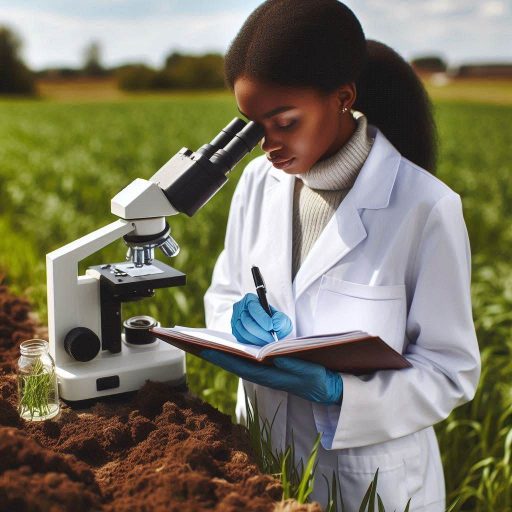Introduction
Soil scientists study soil properties, processes, and management practices.
They analyze soil composition, structure, and nutrient content.
Their work plays a vital role in agriculture, helping farmers maximize crop yields sustainably.
Soil scientists develop best practices for soil health and fertility.
They also advise on soil conservation methods to prevent erosion and degradation.
In environmental conservation, soil scientists assess land use impacts on ecosystems.
They evaluate soil’s role in water filtration and carbon storage.
By understanding soil health, these professionals contribute to climate change mitigation.
They also help restore contaminated lands through remediation techniques.
Soil scientists collaborate with farmers, land planners, and policymakers.
Their research informs agricultural practices and environmental regulations.
They promote sustainable land use that balances productivity and ecosystem health.
Soil scientists are essential for ensuring food security and protecting natural resources.
Their expertise supports agriculture while addressing environmental challenges.
As the global population grows, the demand for soil scientists will continue to rise.
Their work will remain critical in achieving sustainable agricultural practices and environmental stewardship.
Current Job Market Trends
Demand for Soil Scientists in the USA
The demand for soil scientists in the USA has steadily grown over recent years.
Increased awareness of sustainable agriculture and environmental conservation has driven this trend.
Soil scientists play a vital role in addressing critical issues like land degradation and food security.
As a result, their expertise is needed across various sectors.
Types of Industries Hiring Soil Scientists
Several industries are actively hiring soil scientists to address environmental and agricultural challenges.
The agricultural sector, especially, requires professionals to manage soil health and optimize crop production.
Soil scientists contribute to sustainable farming practices by improving soil quality and promoting better land-use management.
Environmental consulting firms also seek soil scientists to assist with land restoration, erosion control, and pollution mitigation projects.
Government agencies such as the USDA and EPA frequently hire soil scientists to develop policies and programs focused on land conservation and climate resilience.
These professionals assess soil conditions and help formulate strategies to manage natural resources effectively.
Research institutions and universities also employ soil scientists for academic research, particularly in soil ecology, biogeochemistry, and climate change.
Urban planning and construction industries have a growing demand for soil scientists as well.
With the expansion of urban development, these professionals ensure that land is suitable for construction while minimizing environmental impacts.
Understanding soil properties is essential for safe and sustainable infrastructure development.
Growth Potential in the Field
The growth potential in the field of soil science remains promising due to increasing environmental challenges.
Soil degradation, loss of arable land, and climate change have placed significant pressure on land resources.
Soil scientists are essential in tackling these issues, thus driving continuous demand for their skills.
The focus on sustainable agriculture and environmental stewardship has created new opportunities for soil scientists.
With climate change concerns escalating, industries are seeking experts to develop climate-resilient farming techniques and land management practices.
This trend boosts the need for soil scientists to help mitigate climate impacts on soil health.
The development of advanced technologies, such as precision agriculture and remote sensing, is another factor driving the growth of soil science jobs.
These tools allow soil scientists to analyze and manage soil conditions more efficiently, making their work even more valuable.
As technology continues to evolve, soil scientists will play a crucial role in integrating these innovations into practice.
Furthermore, the global shift towards renewable energy has fueled the demand for soil scientists in land reclamation and restoration projects.
The transition to sustainable energy sources often requires land assessments to ensure that land use aligns with environmental goals.
The job market for soil scientists in the USA remains strong, with expanding opportunities across various sectors.
As sustainability becomes a top priority, soil scientists will continue to see growth in demand and impact.
Read: Profiles in Success: Leading Chemists of the 21st Century in the US
Educational Requirements
Degree Programs Required to Become a Soil Scientist
Becoming a soil scientist typically requires a solid educational foundation.
Most soil scientists hold at least a bachelor’s degree in soil science, environmental science, agronomy, or a related field.
These programs equip students with essential knowledge about soil properties, chemistry, biology, and management.
Universities across the USA offer specialized courses focusing on soil ecology, soil fertility, and land use, providing a comprehensive understanding of soil systems.
For those aspiring to more advanced roles, pursuing a master‘s or doctoral degree is often necessary.
Graduate programs dive deeper into soil analysis, biogeochemistry, and research methods, which are critical for academic or research-oriented positions.
These advanced degrees also open doors to leadership roles in environmental consulting firms or governmental agencies.
Certifications and Licenses Needed for Specific Roles
Obtaining professional certifications and licenses enhances credibility and employability in the field.
Many soil scientists pursue certification through the Soil Science Society of America (SSSA), which offers credentials like the Certified Professional Soil Scientist (CPSS).
This certification demonstrates a high level of expertise in soil science and requires passing an exam along with meeting experience requirements.
In some states, soil scientists need to be licensed to practice, especially for roles involving environmental assessments or land-use planning.
These licenses ensure that professionals meet the necessary standards for protecting natural resources and adhering to regulations.
Specific licenses vary by state, so it‘s important to research local requirements when pursuing certain positions.
Importance of Continuing Education in the Field
Continuing education is essential in the evolving field of soil science.
As environmental challenges grow more complex, staying updated with the latest research and technology is crucial.
Continuing education programs allow soil scientists to develop new skills, keep up with regulatory changes, and integrate modern tools into their work.
For example, advancements in precision agriculture and remote sensing require soil scientists to stay current with technological innovations.
Attending workshops, conferences, and online courses can help professionals learn about new data analysis methods and soil monitoring systems.
Universities and professional organizations, like the American Society of Agronomy, offer continuing education opportunities tailored to the field‘s evolving needs.
Moreover, participating in research and staying engaged with academic literature keeps soil scientists informed about the latest discoveries.
This knowledge improves their ability to make evidence-based decisions, whether working in sustainable agriculture, environmental conservation, or urban planning.
A strong educational background, combined with certifications and continuous learning, is vital for a successful career in soil science.
Professionals in the field must remain adaptable and informed to address pressing environmental challenges and contribute to sustainable land management.
Read: The Life and Times of a U.S. Physicist: A Day in Detail
Salary and Benefit
Average Salary Range for Soil Scientists in the USA
Soil scientists in the USA enjoy competitive salaries, reflecting the growing demand for their expertise.
Entry-level soil scientists typically earn between $45,000 and $55,000 annually.
As they gain experience, their earning potential increases.
Mid-career professionals can expect salaries between $60,000 and $80,000 per year.
Those with advanced degrees or specialized knowledge often command even higher salaries.
Senior soil scientists, especially those in leadership roles, can earn $90,000 or more.
This growth in salary reflects the increasing recognition of soil science’s importance in agriculture, land management, and environmental conservation.
Additional Benefits and Perks Offered
Besides competitive salaries, soil scientists receive various benefits and perks.
Most employers offer health insurance, retirement plans, and paid time off.
Many positions in government agencies or educational institutions provide comprehensive benefits packages, including pension plans and opportunities.
In the private sector, soil scientists may receive additional incentives such as performance bonuses, profit-sharing, or stock options.
Flexible work schedules, especially for those conducting research or fieldwork, are common perks.
Some employers also offer remote work options or sabbatical opportunities for continued education and growth.
Discrepancies in Pay Based on Experience and Location
Experience significantly influences pay in the soil science field.
Entry-level soil scientists earn lower wages, but their salaries grow steadily as they gain expertise and take on more responsibilities.
Professionals with advanced degrees or certifications, such as a Master‘s or Ph.D., often earn higher wages than their peers.
Geographic location also plays a key role in salary discrepancies.
Soil scientists in states with high demand for environmental management, such as California and Texas, usually earn more.
Urban areas with active land development and environmental initiatives tend to offer higher salaries as well.
In rural regions or areas with less agricultural or environmental focus, salaries may be lower.
However, the cost of living in such areas can balance out the pay discrepancy.
Working in the private sector often results in higher salaries than government or nonprofit roles.
Government roles may come with better long-term stability and benefits.
Soil scientists in the USA have the opportunity to earn competitive salaries with excellent benefits.
Salaries vary based on factors such as experience, location, and industry, but the field offers significant growth potential.
Read: Salary Ranges: What to Expect as a Physicist in the USA

Job Outlook
Expected Job Growth in the Coming Years
The job market for soil scientists is expected to grow steadily over the next decade.
Increased environmental concerns and sustainable farming practices are driving this demand.
The Bureau of Labor Statistics estimates a 5% to 7% job growth rate in the coming years.
Soil scientists are vital for improving soil health and addressing environmental challenges.
Their role is essential for agriculture, land management, and climate resilience.
Factors Influencing the Job Market for Soil Scientists
Several factors are influencing the demand for soil scientists in the USA.
Climate change is a significant driver, leading to concerns like soil erosion and drought.
Soil scientists help mitigate these issues through sustainable land management techniques.
The rise of organic and regenerative farming practices has also increased demand for soil expertise.
Urban development and construction projects rely on soil scientists to assess land use impacts.
These professionals play a crucial role in ensuring sustainable land management practices.
Government policies and environmental regulations are another factor shaping the job market.
Compliance with soil conservation laws creates new job opportunities in both public and private sectors.
Soil scientists also find work in consulting, advising industries on soil quality and land-use planning.
Opportunities for Advancement in the Field
Soil scientists have numerous opportunities for career growth.
Entry-level jobs often involve fieldwork and soil data analysis.
With experience, soil scientists can progress into specialized or leadership roles.
Advanced degrees lead to positions in research, academia, or environmental consultancy.
Certifications, like the Certified Professional Soil Scientist (CPSS), boost career prospects in the industry.
These certifications demonstrate a deep commitment to soil science and environmental stewardship.
Soil scientists can also advance by gaining expertise in related fields.
Knowledge of agronomy, hydrology, and environmental engineering opens doors to interdisciplinary collaboration.
Professionals with diverse skills are highly valued and have broader career options.
Networking with industry organizations, such as the Soil Science Society of America, provides further opportunities for advancement.
Soil scientists are in demand, and job opportunities are set to grow.
Climate change, sustainable farming, and environmental policies will continue to drive this demand.
Opportunities for advancement are plentiful, especially for those pursuing further education and certification.
Soil science offers a promising career path for those committed to environmental conservation and sustainable land use.
Read: Physics Specializations: Choosing Your Path in the U.S.
Skills and Qualities
Technical Skills Required for Soil Scientists
Soil scientists need strong technical skills to succeed in their field.
First, a deep understanding of soil chemistry, biology, and physics is essential.
These experts analyze soil properties like pH, texture, and organic matter content.
They must also use tools and software to conduct soil testing and generate accurate data.
Proficiency in Geographic Information Systems (GIS) is crucial for mapping and analyzing land use patterns.
This helps soil scientists monitor environmental changes and make data-driven recommendations.
Additionally, the ability to collect and interpret field samples is critical in determining soil health.
Advanced lab techniques are another technical skill required.
Soil scientists must know how to operate laboratory equipment to analyze nutrient levels and contaminants.
Experience with statistical analysis software is also beneficial for interpreting large datasets.
Being able to present technical findings in a clear and concise manner is important when sharing results with stakeholders.
Soft Skills Needed for Success in the Field
While technical expertise is important, soft skills are equally essential for soil scientists.
Strong communication skills are necessary for explaining complex soil data to non-experts.
Whether working with farmers, environmental groups, or government agencies, soil scientists need to adapt their communication style.
Collaboration is another key soft skill since many soil scientists work in interdisciplinary teams.
They often collaborate with agronomists, environmental engineers, and hydrologists on large-scale projects.
Problem-solving is a vital skill in soil science.
Soil scientists must identify issues like soil degradation or contamination and develop practical solutions.
They also need strong critical-thinking skills to assess data and make evidence-based decisions.
Flexibility and adaptability are crucial, as soil scientists often work in dynamic environments with changing conditions.
They must handle unexpected challenges in the field, such as extreme weather or shifting project priorities.
Specializations Within Soil Science and Their Specific Skill Sets
Soil science offers several specializations, each requiring specific skills.
One specialization is soil conservation, where scientists focus on preventing erosion and preserving soil health.
These professionals need expertise in sustainable agriculture and land management practices.
Another specialization is soil fertility, which involves improving soil productivity for agricultural purposes.
Soil fertility experts must understand crop nutrient requirements and fertilization techniques.
Environmental soil science is another key specialization.
These scientists assess soil contamination and develop remediation strategies to restore soil quality.
This role requires knowledge of hazardous materials and environmental regulations.
Hydropedology, a growing specialization, combines soil science and hydrology to study water movement in soils.
Hydropedologists need strong skills in water resource management and soil-water interactions.
Soil scientists must possess a combination of technical and soft skills.
Specializations within the field require tailored expertise, offering diverse career opportunities.
By developing these skills, soil scientists can make significant contributions to agriculture, environmental conservation, and land management.
Transform Your Career Today
Unlock a personalized career strategy that drives real results. Get tailored advice and a roadmap designed just for you.
Start NowYou Might Also Like: Famous Epidemiologists and Their Contributions
Challenges and Opportunities
Challenges Faced by Soil Scientists in the Job Market
Soil scientists face several challenges in today‘s job market.
First, limited funding for research projects can restrict opportunities.
Many soil science roles are linked to government agencies or academic institutions, where funding is competitive.
Additionally, the effects of climate change make soil conditions unpredictable, complicating long-term research efforts.
Another challenge is the slow pace of technological adoption in the field.
While new tools and techniques exist, some organizations are slow to implement them, limiting a scientist‘s ability to use the latest technology.
Soil scientists also face challenges in promoting the importance of their work to the broader public.
In rural or remote locations, job opportunities may be scarce, forcing some professionals to relocate.
The interdisciplinary nature of soil science also demands collaboration with other experts.
Sometimes, miscommunication or differences in priorities can create difficulties in interdisciplinary projects.
Furthermore, soil scientists must stay updated on changing regulations and environmental policies, which can add extra layers of complexity to their work.
Opportunities for Innovation and Growth in the Field
Despite these challenges, there are many opportunities for growth and innovation in soil science.
Advances in technology, such as remote sensing and data analytics, offer new ways to study soils more effectively.
These innovations allow for real-time soil monitoring, improving the accuracy of data collection and analysis.
In addition, the growing focus on sustainable agriculture creates more demand for soil scientists to develop eco-friendly land management practices.
As environmental issues gain more attention, the role of soil scientists in climate change mitigation is expanding.
Urbanization also presents new opportunities.
Soil scientists can contribute to urban planning by improving soil health in green spaces and developing methods for soil remediation in polluted areas.
Moreover, the increasing awareness of the global food crisis has created opportunities for soil fertility experts to enhance crop production while preserving soil health.
The rise of precision agriculture, which uses technology to optimize farming practices, further increases demand for skilled soil scientists.
Strategies for Overcoming Challenges and Seizing Opportunities
To overcome challenges, soil scientists must stay adaptable and open to continuous learning.
They should seek out opportunities to work with cutting-edge technologies and integrate them into their research.
Networking with professionals in related fields can also open doors to interdisciplinary projects and grant opportunities.
Soil scientists can overcome funding challenges by diversifying their skill sets to work in both public and private sectors.
To seize opportunities, soil scientists should focus on specializing in emerging areas such as precision agriculture, climate resilience, or urban soil management.
Proactively participating in professional organizations and attending conferences can help scientists stay updated on industry trends.
By maintaining a growth mindset, soil scientists can turn challenges into opportunities and advance in their careers.
While soil scientists face certain obstacles, innovation and growth in the field offer exciting possibilities.
With the right strategies, soil scientists can overcome challenges and make meaningful contributions to environmental sustainability and agriculture.
Conclusion
Soil scientists play a vital role in the USA, contributing to agriculture, environmental conservation, and land management.
Their expertise helps ensure sustainable farming practices, preserve ecosystems, and combat climate change.
As demand for soil scientists continues to grow, there are numerous opportunities for aspiring professionals to make meaningful contributions.
For those considering a career in soil science, now is an excellent time to pursue your goals.
The field offers diverse pathways, from research and academia to working in the private sector or government agencies.
By gaining the right education, certifications, and skills, you can position yourself for success in this essential profession.
If you’re passionate about the environment, food security, or sustainable land use, soil science offers an exciting and rewarding career.
Take the next step by exploring degree programs, joining professional organizations, or seeking internships to gain hands-on experience.
Soil science is more important than ever, and you have the opportunity to be part of its future.
So, if you’re ready to contribute to the world‘s sustainability and environmental health, start pursuing your career in soil science today.
Your efforts will make a difference for future generations.
[E-Books for Sale]
The Big Book of 500 High-Paying Jobs in America: Unlock Your Earning Potential
$19.99 • 500 High-Paying Jobs • 330 pages
Explore 500 high-paying jobs in America and learn how to boost your career, earn more, and achieve success!
See All 500 High-Paying Jobs of this E-Book
1001 Professions Without a Degree: High-Paying American Jobs You Can Start Now
$19.99 • 1001 Professions Without a Degree • 174 pages
Discover 1001 high-paying jobs without a degree! Unlock career tips, skills, and success strategies for just $19.99!




